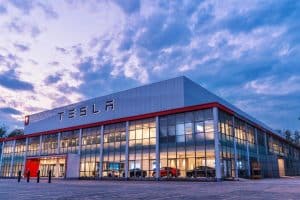- 📅 General Motors and Samsung SDI have postponed the opening of their electric vehicle battery factory in Indiana by one year, now slated for 2027.
- 📊 The delay in the factory’s schedule is due to market conditions and contract details, aligning with a consumer shift toward hybrids over pure EVs.
- 🛠️ The upcoming plant is expected to employ 1,600 workers, with potential discussions involving unionization led by the UAW.
- 🚗 Other automakers such as Ford are also adjusting their strategies to focus more on hybrids, while Hyundai performs well in the EV market.
In a significant development in the automotive industry, General Motors (GM) and Samsung SDI have announced a one-year delay in the opening of their jointly-run electric vehicle (EV) battery factory in Indiana, pushing the timeline to 2027. This decision comes amidst a broader shift in consumer interest toward hybrid electric vehicles, compelling traditional automakers to recalibrate their strategies. Let’s delve deeper into what this delay signifies and its implications for the EV market.
The Factory Delay: What It Means
The Indiana-based battery factory, a $3.5 billion investment by GM and Samsung SDI, was initially planned to be operational by 2026. This delay highlights several critical factors at play:
Market Dynamics
- Consumer Preferences: The automotive industry’s focus is shifting due to rising consumer interest in hybrid vehicles compared to pure EVs. The delay underscores a cautious approach by automakers amid these changing dynamics.
- Market Conditions: With fluctuating EV demand, companies like GM are tempering their expectations. Despite EVs seeing a 7% sales increase in early 2024, legacy automakers find themselves lagging behind competitors like Tesla, Rivian, and Lucid.
Contractual and Labor Considerations
- Impact on Workforce: The factory is poised to create approximately 1,600 jobs. However, a potential hurdle involves discussions with the United Auto Workers (UAW) union concerning worker conditions and possible unionization.
- Contract Details: Specifics about agreements and terms remain under negotiation, indicating complex coordination between corporate partners and labor organizations.
Broader Industry Insights
Automobile Industry’s Strategic Shift
- Ford’s Hybrid Pivot: Ford’s recent announcement to prioritize hybrid vehicles over new EV models till later this decade aligns with GM’s strategy. Such moves reflect a broader industry trend of balancing the hybrid and EV production portfolio.
- Hyundai’s Market Performance: Contrastingly, Hyundai, along with its Kia and Genesis brands, captured a significant 10% share of the U.S. EV market, demonstrating successful positioning in the evolving landscape.
The Role of Hybrids in the EV Evolution
Hybrid vehicles offer a bridge for consumers transitioning from traditional gasoline-powered cars to full electric. They provide the benefits of electric driving while easing concerns about range and charging infrastructure, making them an attractive option for many buyers.
Conclusion: Navigating the Future
The postponement of the GM and Samsung SDI battery factory illustrates both the challenges and opportunities facing the automotive industry. As consumer preferences evolve, automakers must remain agile, balancing innovation with market realities. It is a critical reminder that patience and strategic alignment are imperative in steering the future of electric mobility.





